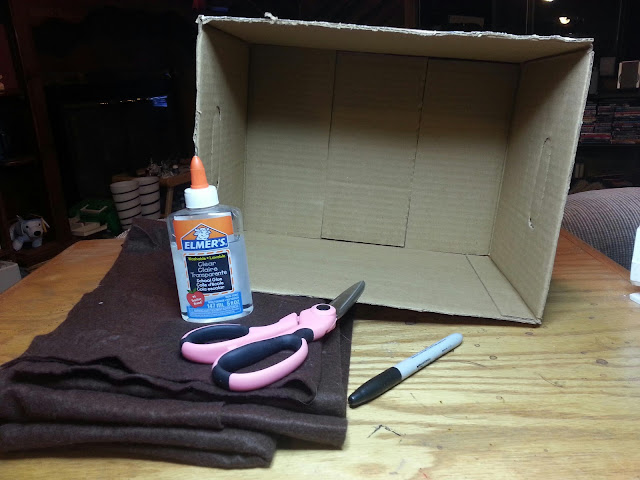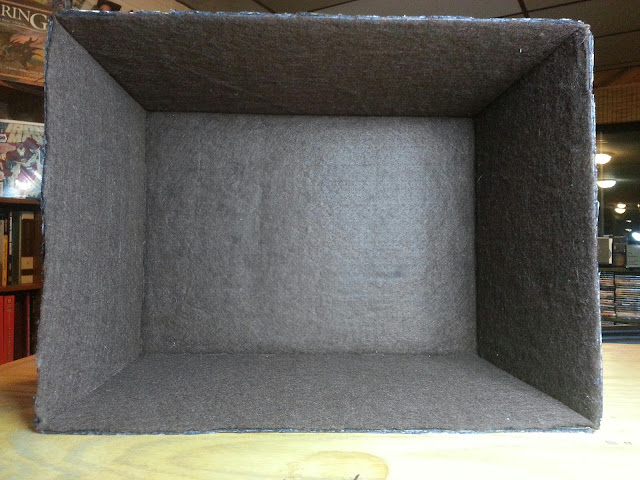Hello everybody, this is Weekend Warrior Ian and today we are going to start off a new segment where we will cover ways to make your models and armies stand out from the crowd. Each week we will cover new, exciting, fun, affordable and easy ways to make your miniatures stand out above the rest. We will go over advanced painting techniques, sculpting tips, how to properly photograph miniatures as well as answer any questions that you may have about modeling and painting.
This week I'm starting out with something that is quite simple and is a great way to create an even toned backdrop to take photographs of your models in before sharing them. This is called a Soft Box, also known as a Light Box, or Diffusion Box. By making one of these you will establish an atmosphere in which you can funnel almost any form of light to a surface which enhances all of the details of the object placed within it. This creates an optimal photography environment for your models. Unfortunately a common thing for people to do after putting hours into their models is to place their masterpiece on a table then snap away. While this does work if you're just wanting to slap something online, you're not going to get to show off a lot of the detailed work as effectively as if you had even lighting around the model. Thus, to achieve the proper look photographers use the soft box, so lets get to going over how to assemble one today!
Before we begin, lets go over how the soft box works. Essentially it is an enclosure, consisting of a light source that is directed onto the back or side walls which are lined with a diffusing material. This material breaks up and disburses even lighting around the area you wish to set up your models in and will help bring out all that intricate work you put into them. A well known source for disbursing light is the umbrella light you may remember from your school picture days. This piece of photo equipment has the light from the bulb (generally built into the umbrella assembly) bounce off the reflective material inside the umbrella to create a soft indirect light. You can also direct secondary lights or even your camera's flash into a soft box with incredible effectiveness. The model's detail wont be dulled down due to uneven lighting or "beach" out due to too much light. If you want to you can also purchase a kit for around $40 USD or so from a variety of places which generally consist of just the box or a set which includes lights or other accessories. Now if we just finished this blog by telling all of you that's exactly what I did it wouldn't be too much fun at all or really informative so how about we get started?!
The first step is to simply find a decent size box. This can be made of pretty much any material depending on what your needs are or what you have available. If you want to be able to fold it up and tuck it away somewhere we would suggest staying away from cardboard or paper as you don't want to wind up with big creases inside of your box. For me personally I'm expecting a new born here over the next couple of weeks and a diaper box seemed to fit the ticket just fine. Then you're going to need some sort of material that you can use to diffuse or soften the light. This can be done with a variety of different materials, from flat spray paint (a gloss spray paint will create too much shine inside of your box) to a fabric such as felt or cloth.
Step One: Gather your materials.
a.) a box (any size, a shoe box is generally the best size)
b.) felt (dark/neutral colors work best for lighting purposes)
c.) scissors
d.) pen/marker
e.) glue
 |
| Box, felt, scissors, glue and marker |
Step Two: Cut your material to size. If you are using a box like us then you can simply cut the top flaps off or you can cut the side walls down if desired. Be conscious with this because if the box is too deep it will not disburse the light as effectively. Consequently if it is too shallow you won't be able to show much off with it. Once your box is assembled and at the desired depth you are ready for step three.
 |
| After tracing the box edges onto the felt with the marker proceed to cut out the pattern |
Step Three: Add the light diffusing material. By adding a solid, generally neutral color to the inside of your soft box you will get rid of anything too glossy in the box. Anything glossy in the photo taking area will magnify light and throw off your desired effect. You can do this with something as simple as priming the inside of the box. For this soft box we are using felt. My wife and I cut the felt in the necessary places so that there are no folds or wrinkles inside the photo area. If you wish you can have folds etc, however they can detract eyes away from your masterpiece. Then we glued it all into place.
 |
| After you have cut the pattern out, spread glue onto the inside of the box edge |
 |
| Place the cut felt pattern onto the newly glued area (tuck in edges if necessary) |
Once you have let the glue dry that is it! A soft box ready to give your models that professional "I paid someone to take these pictures" kinds of look, and without having to do just that either. Well I hope this has been some value to you all and please feel free to submit your soft box pictures and the models you want to show off in them to us at viewers@kreatorhobbies.com so we can share them with others in the community. Please title all mail with TechTuesday in the subject line. You can also send us comments or suggestions or ask questions which we'll be happy to answer in future blogs and vlogs. Thanks again for stopping by from all of us here at Kreator Hobbies and as always,
Inspirata Ex Igne!
-Ian
 |
| End result...felt lined soft box. Ready for pictures of your masterpieces |
 |
| Picture taken with soft box |
 |
| Picture taken without soft box |
 |
| Taken in soft box |
No comments:
Post a Comment